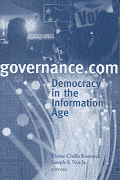Advances in information technology are transforming democratic governance. Power over information has become decentralized, fostering new types of community and different roles for government. This volume—developed by the Visions of Governance in the 21st Century program at the Kennedy School of Government—explores the ways in which the information revolution is changing our institutions of governance. Contributors examine the impact of technology on our basic institutions and processes of governance, including representation, community, politics, bureaucracy, and sovereignty. Their essays illuminate many of the promises and challenges of twenty-first century government. The contributors (all from Harvard unless otherwise indicated) include Joseph S. Nye Jr., Arthur Isak Applbaum, Dennis Thompson, William A. Galston (University of Maryland), L. Jean Camp, Pippa Norris, Anna Greenberg, Elaine Ciulla Kamarck, David C. King, Jane Fountain, Jerry Mechling, and Robert O. Keohane (Duke University).
Authors
Edited by

Elaine Ciulla Kamarck is director of the Visions of Governance for the 21st Century project and the Innovations in American Government program at Harvard University's John F. Kennedy School of Government. She served as senior policy advisor to former Vice President Al Gore, and was instrumental in creating the National Performance Review, a White House policy council to reinvent government. Joseph S. Nye Jr. is University Distinguished Service Professor at the Harvard Kennedy School and a former assistant secretary of defense for international security affairs and chair of the National Intelligence Council.

